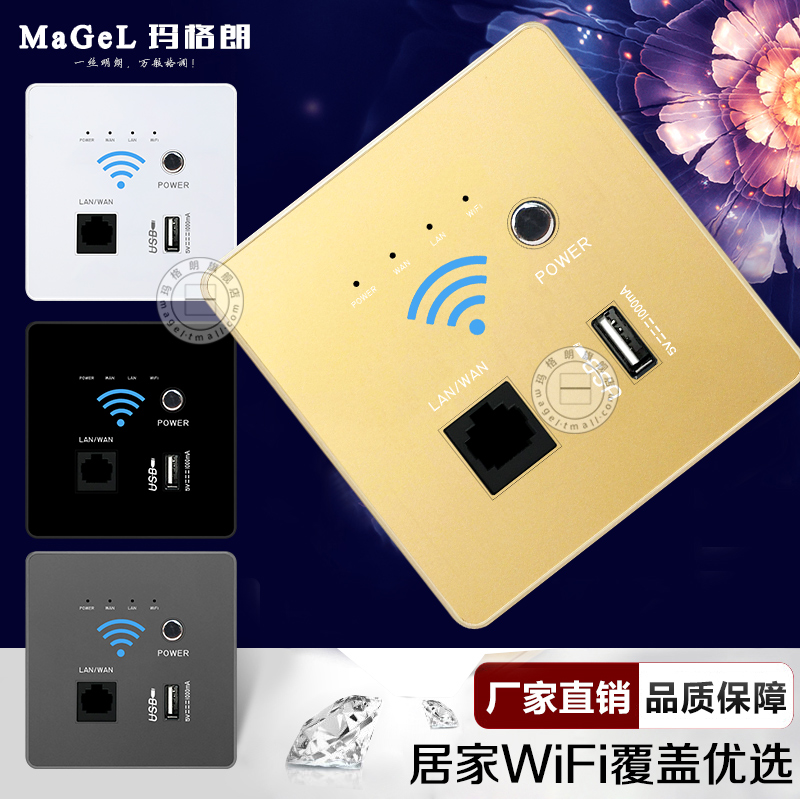路由器技术解析:了解未来的网络连接
观想沮
2025-01-11 10:30:52
0次
路由器技术解析:了解未来的网络连接
随着科技的飞速发展,路由器作为网络连接的核心设备,其技术也在不断进步与革新。为了更好地理解未来的网络连接,本文将深入解析路由器技术的关键要素和发展趋势。
一、路由器技术概述
路由器是一种网络设备,其主要功能是在不同的网络之间进行数据包的转发。通过路由器的连接,用户可以访问互联网、局域网以及其他网络资源。路由器技术涉及网络协议、数据处理、信号传输等多个领域,是现代网络通信的重要基石。
二、路由器技术关键要素
 2. 数据处理能力:路由器的数据处理能力直接影响到网络连接的稳定性和速度。强大的数据处理能力可以确保数据包快速、准确地传输。
3. 信号传输技术:路由器的信号传输技术包括无线和有线两种。无线技术如Wi-Fi、5G等,而有线技术则包括以太网等。这些技术共同决定了网络的覆盖范围和传输速度。
三、路由器技术的发展趋势
1. 高速传输:随着网络应用的日益丰富,用户对网络速度的要求也越来越高。未来,路由器将采用更先进的技术,如5G、Wi-Fi 6等,以实现更高速的数据传输。
2. 智能化:人工智能和机器学习等技术将广泛应用于路由器领域,使路由器具备更强的数据处理能力和更智能的决策能力。例如,智能路由器可以根据用户的上网习惯和网络环境自动调整设置,以实现最优的网络连接效果。
3. 安全性:网络安全问题日益严重,路由器的安全性将更加重要。未来,路由器将采用更先进的加密技术和安全防护措施,以保护用户的网络安全和数据安全。
4. 集成化:未来,路由器将与智能家居、物联网等其他技术进行深度融合,实现更便捷的智能家居控制和更高效的物联网应用。
四、路由器技术的未来展望
随着科技的不断发展,路由器技术将继续迎来新的突破和革新。未来的路由器将更加智能化、高效化、安全化,为人们提供更好的网络连接体验。同时,随着5G、物联网等新兴技术的普及,路由器的应用场景也将更加广泛,为人们的生活带来更多便利和可能性。
2. 数据处理能力:路由器的数据处理能力直接影响到网络连接的稳定性和速度。强大的数据处理能力可以确保数据包快速、准确地传输。
3. 信号传输技术:路由器的信号传输技术包括无线和有线两种。无线技术如Wi-Fi、5G等,而有线技术则包括以太网等。这些技术共同决定了网络的覆盖范围和传输速度。
三、路由器技术的发展趋势
1. 高速传输:随着网络应用的日益丰富,用户对网络速度的要求也越来越高。未来,路由器将采用更先进的技术,如5G、Wi-Fi 6等,以实现更高速的数据传输。
2. 智能化:人工智能和机器学习等技术将广泛应用于路由器领域,使路由器具备更强的数据处理能力和更智能的决策能力。例如,智能路由器可以根据用户的上网习惯和网络环境自动调整设置,以实现最优的网络连接效果。
3. 安全性:网络安全问题日益严重,路由器的安全性将更加重要。未来,路由器将采用更先进的加密技术和安全防护措施,以保护用户的网络安全和数据安全。
4. 集成化:未来,路由器将与智能家居、物联网等其他技术进行深度融合,实现更便捷的智能家居控制和更高效的物联网应用。
四、路由器技术的未来展望
随着科技的不断发展,路由器技术将继续迎来新的突破和革新。未来的路由器将更加智能化、高效化、安全化,为人们提供更好的网络连接体验。同时,随着5G、物联网等新兴技术的普及,路由器的应用场景也将更加广泛,为人们的生活带来更多便利和可能性。
 With the rapid development of technology, routers, as the core equipment of network connections, are constantly undergoing technological advancements and innovations. To better understand future network connections, this article will delve into the key elements and trends of router technology.
Firstly, a brief overview of router technology: routers are network devices that forward data packets between different networks. Through the connection of routers, users can access the internet, local area networks, and other network resources. Router technology involves various fields such as network protocols, data processing, signal transmission, and is an essential cornerstone of modern network communication.
Secondly, key elements of router technology:
1. Network protocols: routers need to support various network protocols such as TCP/IP and IPv6 to achieve interconnection between different networks.
2. Data processing capabilities: The data processing capabilities of routers directly affect the stability and speed of network connections. Strong data processing capabilities can ensure the rapid and accurate transmission of data packets.
3. Signal transmission technology: Router signal transmission technology includes both wireless and wired options. Wireless technologies such as Wi-Fi and 5G, while wired technologies include Ethernet, etc. These technologies together determine the coverage and transmission speed of the network.
Thirdly, trends in router technology development:
1. High-speed transmission: With the increasing richness of network applications, users' demand for network speed is also increasing. In the future, routers will adopt more advanced technologies such as 5G and Wi-Fi 6 to achieve faster data transmission.
2. Intelligence: Technologies such as artificial intelligence and machine learning will be widely applied in the router field, enabling routers with stronger data processing capabilities and more intelligent decision-making abilities. For example, smart routers can automatically adjust settings based on user internet habits and network environment to achieve optimal network connection results.
3. Security: Cybersecurity issues are becoming increasingly severe, and the security of routers will become even more important. In the future, routers will adopt more advanced encryption technologies and security measures to protect user network and data security.
4. Integration: In the future, routers will be deeply integrated with other technologies such as smart homes and the Internet of Things (IoT), enabling more convenient smart home control and more efficient IoT applications.
Finally, a look ahead at the future of router technology: With the continuous development of technology, router technology will continue to usher in new breakthroughs and innovations. Future routers will be more intelligent, efficient, and secure, providing people with a better network connection experience. At the
With the rapid development of technology, routers, as the core equipment of network connections, are constantly undergoing technological advancements and innovations. To better understand future network connections, this article will delve into the key elements and trends of router technology.
Firstly, a brief overview of router technology: routers are network devices that forward data packets between different networks. Through the connection of routers, users can access the internet, local area networks, and other network resources. Router technology involves various fields such as network protocols, data processing, signal transmission, and is an essential cornerstone of modern network communication.
Secondly, key elements of router technology:
1. Network protocols: routers need to support various network protocols such as TCP/IP and IPv6 to achieve interconnection between different networks.
2. Data processing capabilities: The data processing capabilities of routers directly affect the stability and speed of network connections. Strong data processing capabilities can ensure the rapid and accurate transmission of data packets.
3. Signal transmission technology: Router signal transmission technology includes both wireless and wired options. Wireless technologies such as Wi-Fi and 5G, while wired technologies include Ethernet, etc. These technologies together determine the coverage and transmission speed of the network.
Thirdly, trends in router technology development:
1. High-speed transmission: With the increasing richness of network applications, users' demand for network speed is also increasing. In the future, routers will adopt more advanced technologies such as 5G and Wi-Fi 6 to achieve faster data transmission.
2. Intelligence: Technologies such as artificial intelligence and machine learning will be widely applied in the router field, enabling routers with stronger data processing capabilities and more intelligent decision-making abilities. For example, smart routers can automatically adjust settings based on user internet habits and network environment to achieve optimal network connection results.
3. Security: Cybersecurity issues are becoming increasingly severe, and the security of routers will become even more important. In the future, routers will adopt more advanced encryption technologies and security measures to protect user network and data security.
4. Integration: In the future, routers will be deeply integrated with other technologies such as smart homes and the Internet of Things (IoT), enabling more convenient smart home control and more efficient IoT applications.
Finally, a look ahead at the future of router technology: With the continuous development of technology, router technology will continue to usher in new breakthroughs and innovations. Future routers will be more intelligent, efficient, and secure, providing people with a better network connection experience. At the
1. 网络协议:路由器需要支持各种网络协议,如TCP/IP、IPv6等,以实现不同网络之间的互通。

【智能插座】玛格朗智能家居hwifi插座墙壁无线路由器ap面板86型入墙式家用开售价:208.00元 领券价:208元 邮费:0.00
Router Technology Analysis: Understanding Future Network Connections

【智能插座】墙壁路由器无线WiFi千兆入墙AP智能家居面板网线酒店信号中继放大售价:101.00元 领券价:101元 邮费:0.00
相关内容
热门资讯
路由器的进化史:从有线到无线,...
路由器进化史:从有线到无线,再到智能路由器,科技发展推动了路由器的变革。这种变化为人们提供更便捷、高...
路由器市场大解析:2023年热...
路由器市场解析:2023年热门型号比较,竞争激烈。各大品牌如华为、小米、TP-Link和苹果推出各有...
"家用与商用路由器的区别及选择...
本文介绍了家用与商用路由器的区别,并提供了选择建议。家用路由器适合家庭用户,需关注稳定性和易用性;商...
路由器故障排查与解决:常见问题...
本文介绍了路由器常见问题及处理方法,包括无法联网、信号弱、无法登录管理界面、掉线及设备连接限制等问题...
"路由器技术解析:如何提升网络...
本文介绍了提升网络速度与稳定性的技术手段,包括硬件升级、信道优化、智能QoS等措施,通过增强天线信号...
路由器技术发展趋势与未来展望
摘要:
本文探讨了路由器技术的发展趋势与未来展望。随着硬件升级、软件定义网络和网络功能虚拟化、安全...
高速稳定:路由器技术解析与性能...
摘要:
本文详细解析了路由器技术,包括硬件和软件技术,并对不同路由器的传输速度、稳定性和信号性能进...
路由器使用技巧大放送:提升网络...
本文分享了提升路由器网络速度与稳定性的技巧,包括定期重启路由器、调整信道与频段、优化设备位置、使用更...
全面解析不同类型路由器的优缺点
本文解析了不同类型路由器的优缺点,包括家庭路由器、企业级路由器和无线路由器。每种路由器都有其特定应用...
"深度解析:路由器的关键参数及...
摘要:
本文深入解析了路由器的关键参数和功能,包括无线标准、频段、处理器和内存、端口数量和类型等,...
